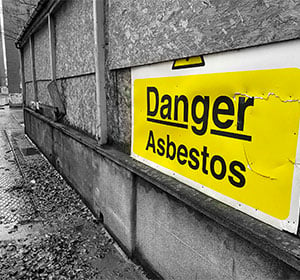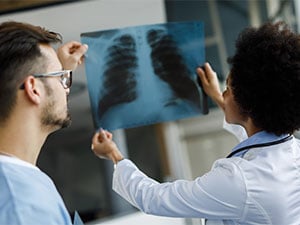Mesothelioma

Mesothelioma Research and Treatment Center
Mesothelioma is a relatively uncommon type of cancer that develops slowly in the lining of the chest or stomach cavity (mesothelium). The mesothelium produces a lubricating fluid that allows the body’s organs to glide smoothly against each other during movement, such as when the lungs expand and contract during the breathing process. Cancer occurs when the DNA of mesothelial cells becomes damaged, causing the cells to grow and divide very rapidly. The excess cells then accumulate and form tumors.
The primary cause of mesothelioma is occupational asbestos exposure, and there is currently no reliable screening test available. As a preventive measure for individuals who are known to have been exposed to asbestos, some physicians may suggest periodic imaging tests, such as chest X-rays and computed tomography (CT) scans, to monitor the lungs for changes that could be a sign of mesothelioma or lung cancer.
How does mesothelioma develop?
A naturally occurring mineral, asbestos is composed of thin, fibrous crystals, which are highly resistant to heat and corrosion. For that reason, asbestos is used to create a variety of consumer products, such as insulation, shingles, flooring, pipes and brakes.
 Whenever asbestos is broken up, such as during the mining process or when asbestos-containing insulation is removed from a building, it creates dust. If the dust is inhaled or swallowed, tiny asbestos fibers can settle into the lungs or stomach cavity and become lodged in the mesothelium. There, they can cause irritation, scarring and cellular damage, which can lead to mesothelioma.
Whenever asbestos is broken up, such as during the mining process or when asbestos-containing insulation is removed from a building, it creates dust. If the dust is inhaled or swallowed, tiny asbestos fibers can settle into the lungs or stomach cavity and become lodged in the mesothelium. There, they can cause irritation, scarring and cellular damage, which can lead to mesothelioma.
What are the specific types of mesothelioma?
Mesothelioma can affect different parts of the body, and the condition is categorized based on the origin of the tumor. The main types of mesothelioma are:
- Pleural mesothelioma – Develops in the lining of the lungs (pleura) and causes respiratory issues. Accounts for 75 percent of all diagnoses.
- Peritoneal mesothelioma – Develops in the lining of the stomach cavity (peritoneum) and causes symptoms in the midsection. Accounts for 15 to 20 percent of diagnoses.
- Pericardial mesothelioma – Develops in the lining of the heart (pericardium) and causes symptoms in the chest cavity. Accounts for 1 to 2 percent of diagnoses.
- Testicular mesothelioma – Develops in the lining of the testes and can be asymptomatic or display symptoms that seem unrelated to the condition. Accounts for less than 1 percent of diagnoses.
What are the symptoms of mesothelioma?
In most cases, mesothelioma symptoms develop gradually, often remaining unnoticeable for many years or even decades after asbestos exposure. The early signs, such as a dry cough, can be mild and easily attributed to the flu, bronchitis or another less serious condition. Some general mesothelioma symptoms include:
- Fever
- Excessive sweating
- Night sweats
- Muscle aches
Other symptoms can vary based on the specific type of mesothelioma and the part of the body affected. For instance, pleural mesothelioma can cause coughing, wheezing, difficulty breathing, chest pain and pleural effusion, a buildup of fluid that causes swelling and bloating around the lungs. Pericardial mesothelioma can cause irregular heart rhythms, chest pain and shortness of breath. Peritoneal mesothelioma can cause nausea, vomiting, stomach pain and peritoneal effusion, a buildup of fluid that causes swelling and bloating in the stomach cavity.
Late-stage mesothelioma symptoms, such as fatigue, loss of appetite and unexplained weight loss, generally worsen as the tumor grows larger.
How is mesothelioma treated?
 In most cases, mesothelioma treatment involves a combination of two or more therapies, such as:
In most cases, mesothelioma treatment involves a combination of two or more therapies, such as:
- Surgery – A surgeon may perform a procedure such as an extrapleural pneumonectomy to remove as much cancerous tissue as possible, a pleurodesis to prevent fluid buildup by sealing the space between the outer lining of the lungs and the chest wall (pleural cavity) or a catheter placement to drain excess fluid, which can help alleviate symptoms. Hyperthermic intraperitoneal chemotherapy, or HIPEC, which involves heating chemo drugs and delivering them directly to the stomach cavity through a medical procedure, is sometimes used to address peritoneal mesothelioma.
- Chemotherapy – Powerful cancer-fighting drugs may be administered orally or intravenously before surgery to shrink a tumor and make it easier to remove or as an alternative to surgery to target and destroy cancerous cells that have spread throughout the body.
- Radiation therapy – When used in conjunction with surgery, radiation therapy can help reduce the risk of a mesothelioma recurrence. If surgery is not an option due to the location of the tumor, radiation therapy can help relieve uncomfortable symptoms, such as chest pain.
Where to seek mesothelioma treatment
In the United States, only a few thousand mesothelioma cases are diagnosed each year. As a result, many physicians do not have sufficient opportunities to gain extensive experience in treating this rare, complex and aggressive condition. Therefore, it’s best to seek treatment at a high-volume cancer center that has a mesothelioma specialty program, such as Moffitt Cancer Center. In our nationally recognized Mesothelioma Research and Treatment Center, our multispecialty team diagnoses and treats all types of mesothelioma, helping many patients achieve the best possible outcome and quality of life.
The scientists, researchers and clinicians in the Thoracic Oncology Program at Moffitt are continually exploring groundbreaking new mesothelioma treatment options, such as immunotherapies, gene therapies and photodynamic therapies, and each finding brings us one step closer to a cure. As a nod to our research breakthroughs, bench-to-bedside approach and robust clinical trials program, we have earned the prestigious Comprehensive Cancer Center designation from the National Cancer Institute, which recognizes our ability to quickly translate our important research discoveries into benefits for our patients.
If you would like more information about mesothelioma, you are welcome to talk with a specialist in the Mesothelioma Research and Treatment Center at Moffitt Cancer Center. To request an appointment, contact us at 1-888-663-3488 or complete a new patient registration form online.
Support the Future of Thoracic Oncology Research and Treatment
When you support Moffitt Cancer Center, you help make breakthrough thoracic research and innovative treatments possible. Give now to support the Thoracic Oncology Program. For more information, call toll-free 1-800-456-3434, ext. 1403.
Helpful Links:
- Patients of Gulf Coast, FL
- Patients traveling from Fort Myers, FL
- Patients traveling from Orlando, FL
- Patients traveling from West Palm Beach, FL
